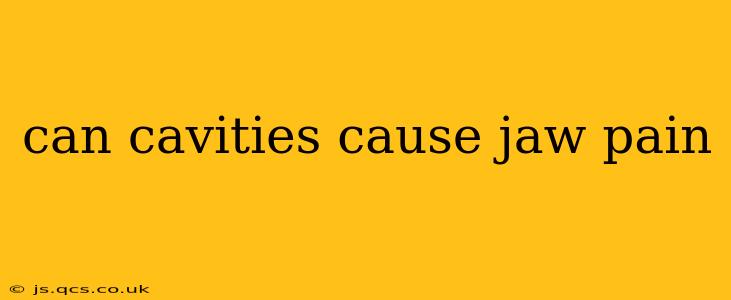Can Cavities Cause Jaw Pain? Understanding the Connection
Yes, cavities can indirectly cause jaw pain, although they don't directly affect the jaw joint itself. The pain often stems from the consequences of untreated cavities and their impact on surrounding structures. This connection is more complex than a direct cause-and-effect relationship, and understanding the nuances is crucial.
How Cavities Can Lead to Jaw Pain: A Detailed Look
The link between cavities and jaw pain isn't immediate. It's typically a secondary effect arising from:
-
Infection and Inflammation: Untreated cavities can lead to dental infections, which spread to the surrounding tissues. This inflammation can cause significant discomfort, radiating to the jaw and temporomandibular joint (TMJ). The infection can also lead to an abscess, a pocket of pus that puts intense pressure on the jawbone, causing severe pain.
-
Abscesses: A dental abscess, a collection of pus caused by a severe infection at the root of a tooth, can be extremely painful and lead to radiating pain in the jaw. The pressure exerted by the abscess on the surrounding bone and tissue can significantly impact the jaw.
-
Chewing Difficulty: Severe tooth decay can make chewing painful or difficult. This might lead to compensatory movements and habits, straining the jaw muscles and TMJ, causing pain. People with severe cavities might unconsciously clench or grind their teeth, exacerbating the pain.
-
Referred Pain: Pain from a severe toothache can sometimes be felt in the jaw as referred pain. The nerves in the area are interconnected, and the brain might misinterpret the origin of the pain.
What are the symptoms of jaw pain caused by cavities?
Jaw pain related to cavities can manifest in several ways. The pain can be:
- Sharp and shooting: Often associated with an acute infection or abscess.
- Dull and aching: Indicative of chronic inflammation or muscle strain.
- Localized or radiating: Pain can be concentrated in one specific area of the jaw or spread to the ear, temples, or neck.
- Aggravated by chewing or biting: A clear indication of the involvement of the jaw muscles and TMJ.
How is jaw pain from cavities treated?
Treatment focuses on addressing the underlying dental problem. This typically involves:
- Root canal treatment: For severely infected teeth, root canal therapy aims to remove the infection from the pulp chamber and root canals, saving the tooth.
- Extraction: In cases where the tooth is beyond saving, extraction might be necessary.
- Antibiotics: To combat the infection and reduce inflammation.
- Pain medication: To alleviate pain and discomfort.
- Muscle relaxants and physical therapy: In cases where TMJ dysfunction is a contributing factor, these therapies can help to relieve pain and restore proper jaw movement.
When should you see a dentist about jaw pain?
If you're experiencing jaw pain that you suspect might be related to cavities, it's crucial to see a dentist immediately. Early diagnosis and treatment are vital to prevent the spread of infection, minimize pain, and save your teeth. Delaying treatment can lead to more extensive damage and more complicated—and more expensive—treatment.
Can I get jaw pain from a filling that's been done incorrectly?
Yes, poorly placed fillings can cause jaw pain. An incorrectly fitted filling can lead to uneven biting, forcing the jaw muscles to work harder, causing pain and possibly leading to TMJ issues. This underscores the importance of seeking dental care from qualified professionals.
Can gum disease also cause jaw pain?
Absolutely. Gum disease, or periodontitis, is another common cause of jaw pain. The infection and inflammation associated with gum disease can spread to the jawbone, leading to discomfort and pain. Similar to cavities, treatment focuses on addressing the gum disease and managing the infection.
This information is for educational purposes only and does not constitute medical advice. Always consult with a qualified healthcare professional for any health concerns or before making any decisions related to your health or treatment.
